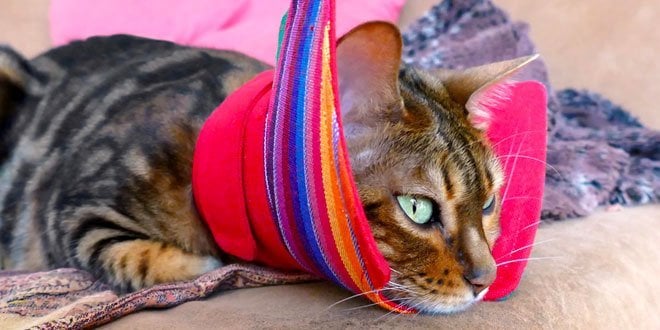[dropcap]S[/dropcap]paying or neutering your Bengal cat is one of the greatest gifts you can give your family and your beloved pet. You probably already know that this low-risk, routine medical procedure prevents unwanted litters and helps control cat overpopulation.
But did you know that it may also prevent certain medical and behavioral issues from developing as your cat matures? Spaying or neutering your Bengal cat is one of the best ways to ensure that he or she leads a long, healthy, and happy life!
But, taking your kitty in for surgery can be scary! For your peace of mind, we’re going to walk you through everything you need to know about spaying or neutering your Bengal cat. That way you can make informed decisions about what’s best for you and your cat.
Why Spaying or Neutering is Part of the Contract When You Buy a Bengal Cat
If you are considering buying a Bengal kitten from a reputable breeder, you will be required to have the kitten spayed or neutered as part of the contract. This policy is a common practice among breeders of purebred cats because it discourages irresponsible breeding without proper health testing and registration.
In fact, many breeders will have the surgery done before you even take your new kitten home. This is great for you because you’ll have one less expense to worry about. It’s also great for the kitten because he or she can recover under the experienced eye of the breeder in a familiar environment. Your kitten will recover faster if the procedure is done while it’s very young, too.
Let’s dive into all of your questions about spaying or neutering your cat in more detail.
The Benefits of Spaying or Neutering Your Bengal Cat
First and foremost, spaying or neutering your Bengal cat prevents unwanted pregnancies. It reduces the overpopulation of feral cats and overcrowding in shelters. Millions of unwanted cats wind up in shelters or on the streets every year, and only a few are lucky enough to be adopted. Doing everything you can to reduce this problem is part of being a responsible pet parent.
But the benefits go far beyond that for you and your kitty. Let’s take a look!
Health Benefits
According to veterinarians who offer spay and neuter services in NYC, spaying or neutering your Bengal cat comes with a variety of health benefits. First, they tell us that certain cancers become less likely or are even eliminated in altered cats.
Specifically, “male cats can no longer develop testicular cancer and the likelihood of prostate cancer is greatly reduced. In females, the risk of uterine and ovarian cancer is eliminated, while the likelihood of breast cancer becomes much less.”
They also tell us that spaying eliminates the risk of pyometra in female cats. Pyometra is a life-threatening infection that’s triggered by a cat’s heat cycle. Once the cat is spayed, she no longer goes into heat, so there’s no more risk.
Behavioral Benefits
Sexually mature cats that haven’t been altered will develop certain hormone-related behaviors to secure a mate. For example, unaltered cats will wander for long distances in search of a potential mate.
And, unspayed female cats can begin to attract unneutered males to your yard when they’re as young as four months. This often leads to fights and potential injuries, infections, and disease transmission for all cats involved. And of course, the more your cat roams, the greater the chances are that he or she will try to cross a busy road at the wrong time.
Spaying or neutering keeps your kitty happy at home and reduces the likelihood of neighborhood cats being attracted to your yard. It also reduces other sexual related behaviors like spraying, yowling, and aggression toward other animals.
Benefits for You
Obviously, your kitty’s health and happiness are your primary concerns. But, it’s also worth noting that altered cats tend to require fewer vet visits, which saves you money in the long run. They also live longer, and who wouldn’t want that?
Of course, the reduction of unwanted behaviors is a major benefit for you and your family, too. Altered cats are less likely to be aggressive toward you or other pets. And finally, you won’t have the responsibility of caring for and finding homes for litter after litter of unplanned kittens.
Benefits for Local Wildlife
Bengal cats love to explore, pounce, and taste everything they can catch. In general, cats are lethal hunters. Mother cats also have a deep compulsion to hunt and provide for their kittens.
And stray cats have to get their food from somewhere, too. This results in domestic cats killing tons of birds and other small wildlife every year.
It’s also worth mentioning that consuming wild animals increases your cat’s risk of contracting intestinal parasites and disease. And, eating a rodent that’s been fed poison by a careless neighbor could be lethal for your beloved kitty,
By altering your cat, you ensure that more unwanted cats don’t end up in the wild. This helps to protect the local wildlife in your area. It also reduces your cat’s prey drive, which keeps him or her safer overall.
What happens during spay or neuter surgery?
Your kitty is your baby. Of course, you want to know what will happen during the surgery! The first thing you need to know is that you’ll need to withhold food from your kitty starting the night before his or her surgery.
When a female cat is spayed, her ovaries and uterus are surgically removed. A spay surgery is a bit more involved than neutering but still considered very safe. The procedure usually takes around 20 minutes for young, healthy cats. Female kitties may require an overnight stay and reduced activity for about a week.
Neutering a male cat involves the surgical removal of the cat’s testicles. The entire procedure can be completed in as little as ten minutes. Males can usually go home the same day of surgery and should be kept on restricted activity for a few days.
The surgical area will be shaved for sanitary reasons on both males and females. The procedures are performed while the cat is under anesthesia to minimize any stress, discomfort, or pain for the kitty. If your cat is older or has any health concerns, your veterinarian may perform blood work before the surgery to ensure that your cat is healthy enough to go under anesthesia.
Most cats are back to normal within a few days. The surgery site is usually healed in less than two weeks. A follow-up appointment isn’t usually required unless your cat has sutures that need to be removed.
Both procedures are considered routine and low risk, with few complications. However, if you are at all concerned about your cat’s behavior, the surgical site, or incision, don’t hesitate to give your vet a call.
It’s also reassuring to know that spay and neuter surgeries are performed by veterinarians who have usually completed these routine procedures hundreds, if not thousands, of times. If you still have questions, the staff at your clinic will be happy to walk you through the entire procedure step-by-step and answer any specific questions you may have.
When should your Bengal cat be spayed or neutered?
Healthy Bengal kittens can be spayed or neutered when they are as young as six weeks, but most vets recommend doing it sometime between four and six months. Having the surgery performed before your cat reaches six months of age will put a stop to sexual related behaviors before they even develop.
If you are dealing with behavior issues in your Bengal cat, spaying or neutering should be considered, regardless of your cat’s age. As long as your vet gives the go-ahead, alteration may help to reduce or eliminate behavior problems even if your cat is no longer a kitten.
Will spaying or neutering change your Bengal cat’s personality?
We love Bengal cats because they are so loving and playful. Naturally, you would be concerned about changes to your cat’s personality after being fixed.
The good news is, other than the sexual related behaviors mentioned above, it is very unlikely that you will notice any changes to your cat’s personality.
If your cat has already passed sexual maturity, spikes and drops in hormones during the first few weeks after the surgery may cause your cat to act a little differently. That will soon go away. Unwanted sexual behaviors will be reduced or even go away with time, too.
In some cases, a male cat may become more docile after he’s neutered. But overall, your cat’s level of playfulness, excitement, and activity should remain the same.
Will your Bengal cat gain weight or change physically after spaying or neutering?
The surgery itself does not cause cats to gain weight. That said, both males and females do tend to gain weight more easily after surgery due to the decrease in sexual behaviors and roaming.
Simply put, cats need fewer calories after they have been spayed or neutered. Not only that, but your cat’s metabolism will naturally slow down a bit as he or she transitions from adolescence into adulthood.
If you continue to feed your cat at the same level as before the surgery, he or she may put on some weight. Your cat’s weight can easily be managed through proper diet and encouraging play and exercise. Your vet can offer advice on how many calories your cat should have each day to maintain a healthy weight.
Other than that, you probably won’t notice any other physical change in your cat’s appearance. However, male cats who are neutered before reaching puberty do not develop the thick skin and large round head that intact male cats often have.
Should your female cat have a litter of kittens before she is spayed?
This is a common myth that we are happy to clarify. There is absolutely no scientific evidence showing any benefit, physical or behavioral, of allowing a female cat to have a litter of kittens before she is spayed.
In fact, female cats are usually at their healthiest before they go through their first heat. Having your Bengal kitten spayed before she reaches six months of age will ensure that she doesn’t develop hormone-related behavior or health concerns that could shorten her life.
Will your male cat feel less masculine after neutering?
This myth also stems from humans projecting their emotions onto their pets. In truth, your cat doesn’t have this sense of masculinity. He won’t have an emotional reaction to the surgery, and for the most part, his personality will still be the same.
Is the surgery expensive?
Thankfully, the cost of spaying or neutering a cat is quite reasonable. Especially when you consider the expense of raising unwanted litters of kittens and getting them all vaccinated and fixed.
Most communities have programs that offer the procedure at a very low cost, too. Check with your local animal shelters to see what’s available in your area.
Our Final Thoughts on Spaying or Neutering Your Bengal Cat
As you can see, spaying or neutering your Bengal cat is a no brainer. It’s all about being a responsible pet parent and putting your cat’s needs and health first. It’s a positive decision that comes with so many benefits for you and your kitty. And, you could end up saving many lives with this one, simple act. What could be better than that?




